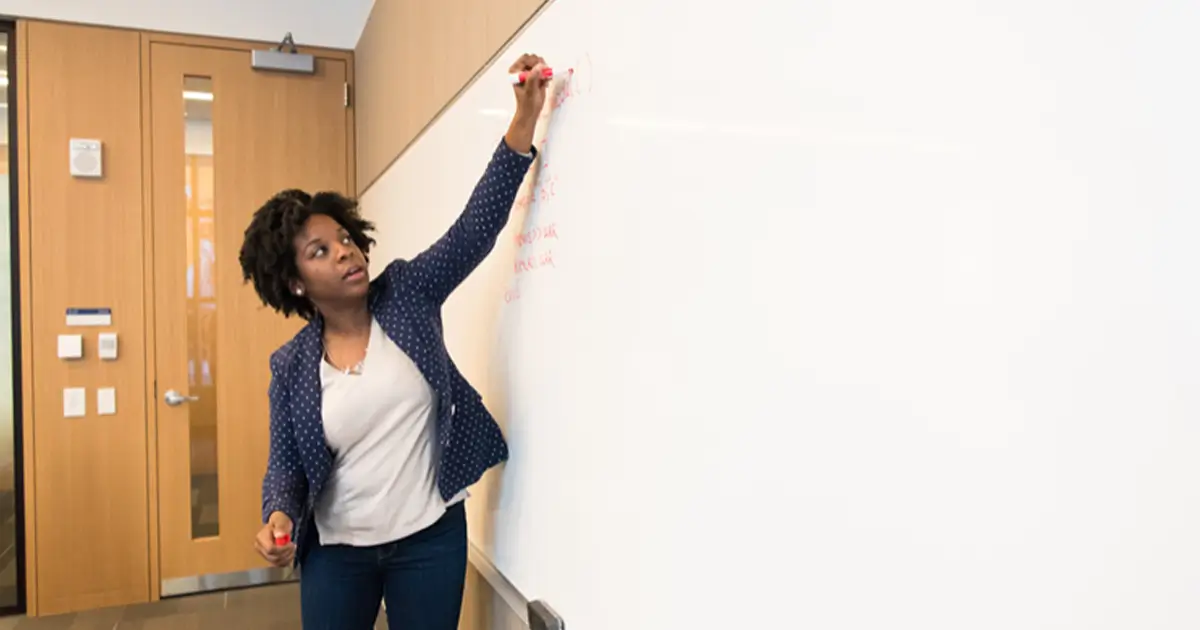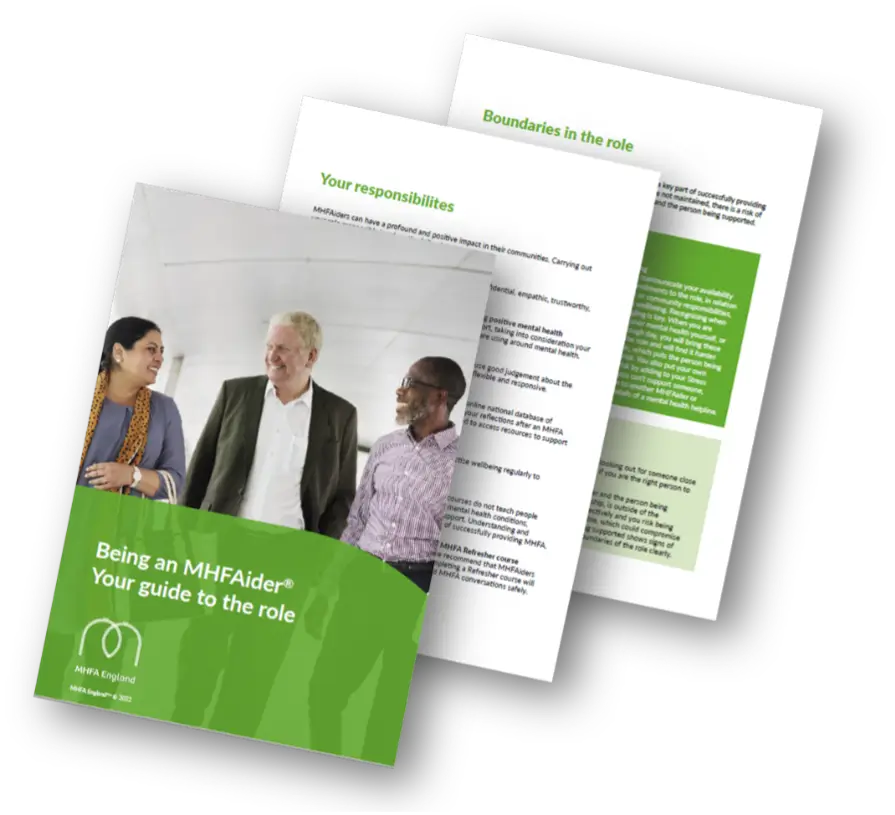

There are important debates about what expertise is required to be in the workplace wellbeing field, for too long I've felt like it's 'not enough' to specialise in training delivery, but no longer! I'm proud of my role as professional trainer and speaker, my lifelong thirst for learning and how I can contribute in a practical way 😊
I value sharing learnings and collaborating with a wonderful range of professionals (in HR, Occupational Health, H&S, Leadership, Strategy, L&D, Community mental health...) and my own specialism is one piece in a workplace mental health jigsaw.
The key when offering services is honesty about our own approach and skillset, the piece of the jigsaw we're offering and how it fits, and importantly never selling our piece as the whole jigsaw! To find out more about where I'm coming from see 'A little bit about me below'.
Start at the beginning and manage expectations.
Let's prioritise supporting businesses to select the right kind of training for where they are and where they want to get to, as part of a broader strategy picture. If a business comes asking for a particular product, I'll certainly challenge them on whether that is the right training intervention for them.
I'm also a pragmatist and it's important we're realistic about the operational challenges businesses face whilst not pandering to quick-fix tick-boxes.
Learning & Development is NOT...
To bust some L&D myths, check out this hilarious post. Spoiler alert, there are no magic wands, fairy godmothers or brooms, and I'll also add flying carpets!
L&D is not an air freshener - it can't mask the underlying issues of a bad culture...L&D is not a food delivery app taking orders and delivering in 30 minutes... L&D is not a fairy godmother -it can't make employees happy despite excessive workloads... - Craig Trousdale.
Whilst the turbo-charging of workplace mental health awareness raising has been powerful, there are plenty of red flags including the sharing of overly generic, intense content without the learner's needs in mind.
By asking plenty of questions and listening, I customise my offering according to roles, responsibilities and boundaries. For example, managers need manager-specific training, front-line teams need to explore the dynamics around clients, not just colleagues.
There's no one size fits all, if the group has a mix of roles, we need to acknowledge and adapt to that.
A decent training session will outline the essentials for participants that relate to their official and unofficial roles and enable them to have rich discussions and clarify some next steps for them and their organisation.
And if you're doing accredited training such as Mental Health First Aid, when you complete that course, not to be a party pooper, but…
🎉Congratulations you are now a generic Mental Heath First Aider! 🎉
The real hard work (& there’s plenty more!) is that key stakeholders, including leaders and representatives from different parts of the business spend time shaping what the 'insert business name' version of Mental Health First Aider/ Champion looks like.

There's a place for both, each with pros and cons. There are plenty of full-on opinions of "It's the best/its' the worst" for big products like Mental Health First Aid and it's helpful to have nuanced conversations.
The rubber stamp of a respected body can reassure as it indicates that certain standards have been met, and it's more scalable. Problems occur when a product is oversold or mis-sold and not delivered with due diligence.
Obviously, the content of accredited training is pre-set and there can be restrictions such as minimum numbers and extra admin hoops for participants to jump through and registration/guide costs. I totally get the importance of maximum numbers, minimum numbers can be frustrating when a skilled facilitator will bring out the best for small groups too.
Customised training
Customised training allows flexibility and freedom to focus even more on client challenges and needs. That might mean you don't get fancy guides or certificates, but with a small supplier like me you will get thoughtful practical resources and because I enjoy customising you get extra value rarely reflected in the figures!
Joining instructions - get personalising!
It's an opportunity to build rapport in advance, position the training and build the foundations of safety with the mental health aspect. I've recently spent ages customising and personalising my Mental Health First Aid Joining instructions. Putting myself in the participants' shoes and thinking what would ease my nerves and feel most welcoming and manageable as opposed to making my head explode with technical stuff before I've even started the workshop!
The award for best joining instructions I've received goes to Rod Webb who runs online Discovery Days for L&D professionals to experience, share and try out new stuff.
Maybe you don't get around to reading JI's, but I do and his Dress Code one-liner had me in stitches. Most importantly it put me at ease which was extra helpful as I was delivering my Braver Boundaries session and feeling a bit nervous 😉
Dress Code: Clothing is mandatory - but what you wear is entirely up to you - Rod Webb.
Whatever the training intervention, method of delivery, and ‘messy reality’ limitations, it’s worth considering…
Online versus face -to-face
Online can be a flexible, accessible and an engaging option but only if done right. Zoom is always my preference for its superior options for a workshop rather than a meeting feel.
Whatever the vehicle, 'Zoom' fatigue is real and we need to make lots of adaptations to keep engagement going and be particularly mindful of safety responsibilities with mental health topics. We need more nuance than ‘cameras always on’ as there are different ways to engage.
Safety first
Have discussions about how to build this in before, during and after the session. Because of the added connection from f2f and I know that participants and workplaces benefit as much as I do, I'm prioritising and promoting face-to-face. I'm realistic it won't always be practical but specifically with this kind of training and our 24/7 noisy world, it can add so much value.
Making the uncomfortable more comfortable
Whether online or f2f, cater for a range of learning styles and needs, personality preferences, dynamics and vibes. As a participant I usually have to sit on my hands as I always want to ask questions and comment 😂. But sometimes even with an engaging online session, I'm in a quiet mood and have just wanted to absorb the info and reflect later on my own.
That's where variety is the spice of life and shy groups can come alive split into breakout rooms. Leanne Hughes's 2-Hour workshop blueprint that I feature below has a wealth of practical ideas!
Even just stopping 'Share slides' for a group discussion can encourage a sense of connection and that 'all in the room together' feel.
Workshop v webinar or presentation
Be clear which you're offering and recommending and manage expectations. If the numbers start to grow that may no longer be a workshop. A webinar can (and should) still invite engagement but has less emphasis on exploration and a different vibe. A skilled facilitator can adapt in the moment and make a webinar more like a workshop if the numbers allow it and attendees are expressing their keenness to participate in this way.
To record or not to record
If it's a workshop format, recording is a no-no for me! And if the aim is to build trust and encourage participation, I don't recommend it for webinars either, always discuss upfront.
Content - Less is more
Yep, guilty as charged, including this blog! I regularly give myself a ‘talking to’, feeling such a weight of responsibility with the topic of mental health, it's hard not to include everything but the kitchen sink in training. Prioritising time for exploration is when the magic happens and by including robust follow-up resources I'm satisfied that due diligence is done, thanks as ever for the reminder Leanne Hughes:
Master brevity...Be ruthless with what you leave out...More information doesn't always equal more value - Leanne Hughes.
Practise makes perfect
It’s never about being technically perfect but if you want to build skills, skills practice scenarios can super-charge learnings. For a richer gold standard experience, you can’t beat 'forum theatre'. Sounds very fancy but can be as simple as bringing in a trusted actor for a couple of scenarios over a few hours.
It’s all in the positioning and running because utter the phrase 'Role play' and most of the room wants to run away, me included!
Shout out to the fab freelance actor Lee Hunter who has been bringing such compassion and depth to his craft supporting my manager training deliveries in a railway setting. We positioned the skills practice as Hope through Conversation Experiments with some incredible participant team-work, exploration and even laughs to reach a place of deeper listening, understanding and trust. Along the way there is plenty of falling into traps such as trying to fix and in the end the magic comes from all the light bulb moments and rich team experience.
Creating accessible training
Most of us have more to learn about improving accessibility for participants. Sophie Cooke, a key contributor to the Taye Training Creating Accessible Training guide educates so she and her buddies with disabilities don't have to be treated as 'a nuisance' and put up with at best shoddy treatment, and at worst discriminatory.
We’ve experienced asking for slides or handouts ahead of time only to be told, ‘we don’t do that’. We’ve turned up to a ‘fully accessible’ venue to find that the accessible toilet is being used as a storage room; and we’ve notified training providers of our limited mobility only to be asked to do an activity that involves lots of movement around the room - Sophie Cooke.
As she points out we all have needs and taking them into account builds 'a more supportive environment for everyone'.
I had the privilege of proofreading the guide and shared a few insights from my experience delivering in a range of settings and as a freelancer with limited resources. The key for all of us providers is curiosity and creating such a welcoming experience through our pre-course exploring and communications that we enable learners to discuss their needs with us in advance.
Post-course feedback and follow-up
Too big a topic for now, it's more than a case of getting 'Happy sheets' to satisfy our egos! We need to elicit meaningful feedback and encourage participants and leaders to take small steps to embed learnings at both a personal and organisational level. A simple step is checking confidence and knowledge/skills/specific learnings before and after and checking-in say 3-6 months later to follow-up.
Valuable resources and tips for 'non-boring' training
No, I'm not on commission, I just celebrate anyone sharing robust learnings and raising standards!
Sheridan Webb has user-friendly training design insights and Rod Webb has a Discovery Days and Training library.
The two-hour blueprint book by Leanne Hughes’ is a must-read. I found so useful I bought it again when I mislaid it moving house 😂
The Mental Health First Aid 2-day workshop I offer has a good focus on roles, responsibilities and boundaries for the MHFAider role. Participants get 3-year access to an MHFAider Support App® and membership of the Association of Mental Health First Aiders with ongoing learning opportunities. I deliver face-to-face open courses in partnership with my trusted colleague Laura Rigden at the powerful charity Art4Space.
i-act a less well-known product accredited by the Royal College of Psychiatrists. It's workplace specific workshop with a manager version packed with practical tools. It has the added bonus of flexibility with an international version.
At risk of exceeding my self-promo cringe quota 😉 here's the i-act training video
I prioritise making the uncomfortable more comfortable and balance sensitive topics with the need to have fun whilst learning! It’s all about thriving not 'in spite of', but because of our learnings from challenges to find ways to manage our ever-complex and messy realities.
Since I’m generous sharing learnings and naturally curious (teachers used that as code for me asking too many questions!), feel free to get in touch as I’m happy to be a sounding board regardless of where you’re at on the exploration journey!

Hi, I’m Emma! With 30 years in Learning & Development and varied roles, I specialise in helping workplaces navigate the 'messy reality' of mental health conversations with confidence as part of a broader strategy. My experiences in a range of workplace settings, and as a mental health charity trustee and member of NHS suicide awareness working groups, drive me to provide practical approaches that create real impact. I ensure every session is engaging, down-to-earth, and actionable.
Read More Of My Blogs
Read More Of My Blogs